- Home
- David Leavitt
A Place I've Never Been Page 6
A Place I've Never Been Read online
Page 6
“You’re a liar,” I said, and, grateful for the anger, she crumpled up her face, screamed, “Damn you, Ellen,” and ran out the door.
As I said, our fights were glorious.
All she left behind were her braids.
Across the dining room, Diana stood with Charlie, holding a big knife over the wedding cake. Everyone was cheering. The knife sank into the soft white flesh of the cake, came out again clung with silken frosting and crumbs. Diana cut two pieces. Their arms intertwined, she and Charlie fed each other.
Then they danced. A high-hipped young woman in sequins got up on the bandstand and sang, “Graduation’s almost here, my love, teach me tonight.”
After the bride and groom had been given their five minutes of single glory on the dance floor, and the parents and grandparents had joined them, I felt a tap on my shoulder. “Care to tango avec moi, my dear?” Walter said.
“Walter,” I said, “I’d be delighted.”
We got up from the table and moved out onto the floor. I was extremely nervous, sweating through my dress. I hadn’t actually spoken to Diana yet, doubted she’d even seen me. Now, not three feet away, she stood, dancing and laughing, Mrs. Mark Charles Cadwallader.
I kept my eyes on Walter’s lapel. The song ended. The couples broke up. And then, there she was, approaching me, all smiles, all bright eyes. “Ellen,” she said, embracing me, and her mother shot us a wrathful glance. “Ellen. Let me look at you.”
She looked at me. I looked at her. Close up, she looked slightly unraveled, her make-up smeared, her eyes red and a little tense. “Come with me to the ladies’ room,” she said. “My contacts are killing me.”
She took my hand and swept me out of the ballroom into the main hotel lobby. Everyone in the lobby stared at us frankly, presuming, I suppose, that she was a runaway bride, and I her maid. But we were only running away to the ladies’ room.
“These contacts!” she said once we got there, and opening one eye wide peeled off a small sheath of plastic. “I’m glad you came,” she said, placing the lens on the end of her tongue and licking it. “I was worried that you wouldn’t. I’ve felt so bad about you, Ellen, worried about you so much, since—well, since things ended between us. I was hoping this wedding could be a reconciliation for us. That now we could start again. As friends.”
She turned away from the lamplit mirror and flashed me a big smile. I just looked up at her.
“Yes,” I said. “I’d like that.”
Diana removed the other lens and licked it. It seemed to me a highly unorthodox method of cleaning. Then, nervously, she replaced the lens and looked at herself in the mirror. She had let down her guard. Her face looked haggard, and red blush was streaming off her cheeks.
“I didn’t invite Leonore for a reason,” she said. “I knew she’d do something to embarrass me, come all dyked out or something. I’m not trying to deny my past, you know. Charlie knows everything. Have you met him?”
“Yes,” I said.
“And isn’t he a wonderful guy?”
“Yes.”
“I have nothing against Leonore. I just believe in subtlety these days. You, I knew I could count on you for some subtlety, some class. Leonore definitely lacks class.”
It astonished me, all that wasn’t being said. I wanted to mention it all—her promise on the doorstep, the gun, the schizophrenic girl. But there was so much. Too much. Nowhere to begin.
When she’d finished with her ablutions, we sat down in parallel toilets. “It is nearly impossible to pee in this damned dress,” she said to me through the divider. “I can’t wait to get out of it.”
“I can imagine,” I said.
Then there was a loud spilling noise, and Diana gave out a little sigh of relief. “I’ve got a terrible bladder infection,” she said. “Remember in college how it was such a big status symbol to have a bladder infection because it meant you were having sex? Girls used to come into the dining hall clutching big jars of cranberry juice and moaning, and the rest of us would look at them a little jealously.” She faltered. “Or some of us did,” she added. “I guess not you, huh, Ellen?”
“No, I was a lesbian,” I said, “and still am, and will be until the day I die.” I don’t know why I said that, but it shut her up.
For about thirty seconds there was not a sound from the other side of the divider, and then I heard Diana sniffling. I didn’t know what to say.
“Christ,” Diana said, after a few seconds, and blew her nose. “Christ. Why’d I get married?”
I hesitated. “I’m not sure I’m the person to ask,” I said. “Did your mother have anything to do with it?”
“Oh, Ellen,” Diana said, “please!” I heard her spinning the toilet paper roll. “Look,” she said, “you probably resent me incredibly. You probably think I’m a sellout and a fool and that I was a royal bitch to you. You probably think when Charlie does it to me I lie there and pretend I’m feeling something when I’m not. Well, it’s not true. Not in the least.” She paused. “I was just not prepared to go through my life as a social freak, Ellen. I want a normal life, just like everybody. I want to go to parties and not have to die inside trying to explain who it is I’m with. Charlie’s very good for me in that way, he’s very understanding and generous.” She blew her nose again. “I’m not denying you were part of my life, that our relationship was a big thing for me. I’m just saying it’s finished. That part’s finished.”
Defiantly she flushed.
We stood up, pulled up our underpants, and stepped out of the toilet booths to face each other. I looked Diana right in the eye, and I noticed her weaken. I saw it. I could have kissed her or something, I knew, and made her even more unhappy. But I didn’t really see the point.
Afterwards, we walked together out of the ladies’ room, back into the ballroom, where we were accosted by huge crowds of elderly women with purses that looked to me like the shellacked sushi in certain Japanese restaurant windows.
“Was it okay?” Walter asked me, taking my arm and leading me back to our table for cake.
“Yes,” I said. “Okay.” But he could see from my face how utterly miserable I was.
“Don’t even try,” Juanita said, giggling hysterically to herself as we got back to the table. “You’re not getting a word out of me, so don’t even begin to ask me questions.”
Once I knew a schizophrenic girl. Her name was Holly Reardon and she was my best friend from age five to eight. We played house a lot, and sometimes we played spaceship, crawling together into a cubbyhole behind my parents’ sofa bed, then turning off the lights and pretending the living room was some fantastic planet. We did well with our limited resources. But then money started disappearing, and my mother sat me down one day and asked me if I had noticed the money always disappeared when Holly came to visit. I shook my head vigorously no, refusing to believe her. And then one day my favorite stuffed animal, a dog called Rufus, disappeared, and I didn’t tell my mother, and didn’t tell my mother, until one day she said to me, “Ellen, what happened to Rufus?” and I started to cry. We never found Rufus. Holly had done something with him. And it wasn’t because of me that she went away, my parents assured me, it wasn’t because of me that her parents closed up the house and had to move into an apartment. Holly was not well. Years later, when I went to work at the state hospital, I think somewhere, secretly, I hoped Holly might be there, a patient there, that we might play house and spaceship in the linen closets. But of course she wasn’t. Who knows where she is now?
After the wedding I felt so depressed I had ice cream for dinner. I did several acrostic puzzles. I watched The Honeymooners and I watched Star Trek. I watched Sally Jessy Raphael. I watched The Twilight Zone. Fortunately, it was not one of the boring Western ones, but an episode I like particularly, about a little girl with a doll that says things like, “My name is Talking Tina and I’m going to kill you.” I wished I’d had a doll like that when I was growing up. Next was Night Gallery. I almost never watch Nig
ht Gallery, but when I do, it seems I always see the same episode, the one about two people who meet on a road and are filled with a mysterious sense of déjà vu, of having met before. It turns out they live in the mind of a writer who has been rewriting the same scene a thousand times. Near the end they rail at their creator to stop tormenting them by summoning them into existence over and over, to suffer over and over. At the risk of mysticism, it seems to me significant that every time I have tuned into Night Gallery in my life it is this episode I have seen.
Then there was nothing more good to watch.
I got up, paced around the house, tried not to think about any of it: Holly Reardon, or Natalie, or Diana, or those poor people living in the mind of a writer and getting rewritten over and over again. I tried not to think about all the Chinese dinners I wasn’t going to be able to have because I’d spent so much money on that Cuisinart for Diana, who probably could afford to buy herself a hundred Cuisinarts if she wanted. I tried not to think about their honeymoon, about what secret, glorious place they were bound for. It was too late for it to still make me mad that the whole world, fired up to stop me and Diana, was in a conspiracy to protect the privacy of the angelic married couple she had leapt into to save herself, to make sure their perfect honeymoon wasn’t invaded by crazy lesbian ex-lovers with shotguns and a whole lot of unfinished business on their minds. Unfortunately, any anger I felt, which might have saved me, was counteracted by how incredibly sorry I felt for Diana, how sad she had seemed, weeping in the ladies’ room on her wedding day.
I went to the closet and took out Diana’s braids. God knows I hadn’t opened the box for ages. There they were, the braids, only a little faded, a little tangled, and of course, no longer smelling of shampoo. I lifted one up. I was surprised at how silky the hair felt, even this old. Carefully, to protect myself, I rubbed just a little of it against my face. I shuddered. It could have been her.
I went to the bed, carrying the braids with me. I laid them along my chest. I have never had long hair. Now I tried to imagine what it felt like, tried to imagine I was Diana imagining me, a woman she had loved, a woman she had given her hair, a woman who now lay on a bed somewhere, crying, using all the strength she could muster just to not force the braids down her throat. But I knew Diana was on a plane somewhere in the sky, or in a car, or more likely than that, lying in a heart-shaped bed while a man hovered over her, his hands running through her new hair, and that probably all she was thinking was how much better off she was than me, how much richer, and how lucky to have escaped before she was sucked so far in, like me, that it would be too late to ever get out. Was I so pathetic? Possibly. And possibly Diana was going to be happier for the choice she had made. But I think, more likely, lying on that mysterious bed, she was contemplating a whole life of mistakes spinning out from one act of compromise, and realizing she preferred a life of easy mistakes to one that was harder but better. Who was I to criticize? Diana had her tricks, and so did Juanita, and so, for that matter, did that schizophrenic girl stabbing at her melon balls. We all had our little tricks.
I took the braids off myself. I stood up. A few hairs broke loose from the gathered ropes, fell lightly to the floor. They didn’t even look like anything; they might have been pieces of straw.
Ayor
The summer I turned nineteen I took a short, sad, circular trip to the Great Smoky Mountains National Park, in Tennessee, with a friend I was in love with, or would have been in love with, had I known more about him or about myself. His name was Craig Rosen, and he lived down the hall from me freshman year in college. When he suggested taking the trip as a way of passing the interval between the end of school and the beginning of our summer jobs, I said yes in a second. Craig was good-looking, dark-haired and dark-eyed, and I desperately wanted to see him naked. I didn’t know much about him except that he was an economics major, and sang in the glee club, and spent most of his time with a fellow glee-clubber, a thin-mouthed Japanese girl named Barbara Love. Nevertheless I had certain suspicions, not to mention a rabid eagerness to be seduced, which, in the end, was never satisfied. For five nights Craig and I shared a bed in that curry-smelling motel in Gatlinburg, and for five nights we never touched each other—a fact which, in all the years since, we have not talked about once. There is a code which applies here, I think, having to do with friendship and sex and their exclusivity, a code at least as mysterious and hermetic as the code of the Spartacus Guide which led us through Europe a few summers later. But that is jumping ahead of things.
We were, then, nineteen, East Coast college boys, Jews, homosexuals (though this we hadn’t admitted). Gatlinburg, Tennessee, on the fringe of the park, with its sticky candy shops, its born-again bookstores and hillbilly hayrides, may seem an unlikely place for us to have confronted (as we never did, it turned out) our shared secret sexuality. But I had grown up in amusement parks, glorying in the smell of diesel fuel and cotton candy, in roller coasters, in the wildness of rides that whirled at high speeds, round and round. I had had my first inkling of erotic feeling on those rides, when I was eleven, when the heavy artificial wind of a machine called a Lobster pushed my best friend Eric’s body into mine, so that I couldn’t breathe. Gatlinburg, with Craig, was full of that same erotic heat, that camaraderie of boys which seems always on the verge of dissolving into lust. Like children released from the better advice of our parents, we ate only the junk food that was on sale everywhere in the town—candied apples, wheels of fried dough swirling in vats of grease, gargantuan hamburgers and cheeseburgers. Craig shaved in his underwear, like a man in a television commercial, something I imagined to be a gesture of sexual display. Soon, I hoped, his eyes would meet mine; he would turn away from the mirror in the bathroom, his face still half covered with shaving cream, and begin walking toward me. But it never happened. Why? I wondered each night, curled into my half of the bedsheets, far away from Craig. It would have been so easy for him to have done me that favor, I thought, and liberated me from my crabbed, frightened little body. And though I have come up, over the years, with many elaborate psychological explanations for why Craig and I didn’t sleep together in Gatlinburg, only recently have I been able to admit the simple truth: we didn’t sleep together because Craig didn’t want to; to put it flatly, he wasn’t in the least attracted to my body. I did not know it yet, but even at nineteen he had already had hundreds of men, including a famous porn star. Sex—for me a quaking, romantic, nearly unimaginable dream—was for him an athletic exercise in alleviating boredom. It was—and this, I think, is the key—a way of determining self-worth; he wanted only the most beautiful, most perfect men, not in order to possess them, but because their interest in him, their lust for him, confirmed that he was part of their elite. It was a matter of class, pure and simple; like his father before him, he wanted into a country club. And though it probably gratified him, on some mean level, to see his preening self reflected in my burning eyes in the bathroom mirror, sleeping with me not only wouldn’t have gained him any points, it probably would have lost him some.
So why did Craig want me to come to Tennessee in the first place? It occurs to me now that my very lack of sexual appeal might have made me appealing to Craig in other ways, that week we spent together. I think I offered him a kind of escape, a safety hatch through which he could flee a life that, as I would later learn, was beginning to consist of little other than showers at the gym, circle jerks in Central Park, afternoons at the glory holes near Times Square. Perhaps he craved my innocence; perhaps he envisioned a wholesome, rejuvenating week in the wilderness; perhaps he was recovering from some casually transmitted disease. I don’t know because, as I said, Craig and I have never discussed that week in Gatlinburg, and I doubt we ever will.
When we arrived at the Great Smoky Mountains National Park, the first thing we did was go to the ranger station to plan our trip. We were going to do a six-day circle of the park, long planned by Craig, hiking seventy-five miles of forested mountain, much of it along the famous
Appalachian Trail. The ranger girl chewed gum as she drew us a map. When she explained that we would probably be four days without human contact, four days in the depths of the park, more than a day’s hike away from civilization, we looked at each other. Perhaps, in all this organizing, we simply hadn’t thought enough about the realities of camping out for so long. What if something went wrong? What if a bear attacked us? Six days, alone, sleeping outdoors, the weather unpredictable—the prospect was terrifying to us.
So instead of risking the dangers of the forest, we “camped out” in a motel in Gatlinburg that was operated by a family of Sikhs. The proprietress painted a dot on her forehead each morning which by nighttime, when we saw her drift by in her mass of sari, was beginning to stream out like a black-rayed sun. She and her family lived in a group of rooms behind the desk from which a strong odor of cumin emanated, wafting down the linoleum hallways, inhabiting our room like an incense. There was only one bed. We lay far apart, on either side of it, Craig in his skimpy underpants, me in pajamas. I tried to engage him in the closest thing I could muster to sexy talk: I asked him why he preferred jockeys to boxers. He said he liked the “tighter feel,” whatever that means. Then he fell asleep.
For lunch, out of guilt, we sat at a picnic site and ate the dehydrated spaghetti and meatballs and chicken à la king I had been so eager to taste ever since we had bought them in that camping store on Park Row. Afterwards—having made our perfunctory stab at the park—we headed back into town, to wander the shopping malls of Gatlinburg, ride the funicular, play at the hillbilly miniature-golf courses. Craig had never said anything explicit to me about his sexual life, though he was always mentioning his ex-girlfriend in Connecticut. Eager for signs, evidence, some sort of recognition, I tried to give off feeble signals of my own—that is, I glanced at him needfully, and sat with him, smiling like an indulgent mother, while he ate the fried dough he so loved. None of these techniques worked. As I have witnessed a hundred times over the years we’ve known each other, Craig is not in the least impressed by romantic mooning; in fact, it rather disgusts him. If he spared me his contempt, that week in Gatlinburg, it was probably only because he didn’t recognize how far gone I was into fantasy.

 Shelter in Place
Shelter in Place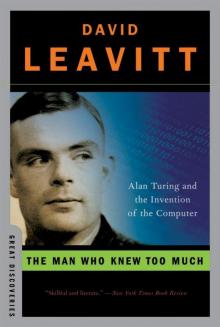 The Man Who Knew Too Much: Alan Turing and the Invention of the Computer (Great Discoveries)
The Man Who Knew Too Much: Alan Turing and the Invention of the Computer (Great Discoveries)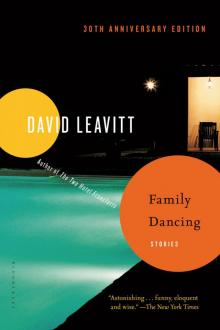 Family Dancing
Family Dancing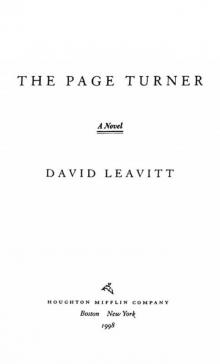 Page Turner Pa
Page Turner Pa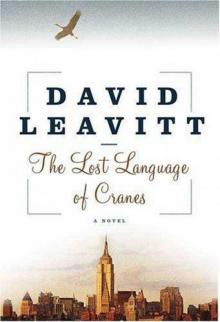 The Lost Language of Cranes: A Novel
The Lost Language of Cranes: A Novel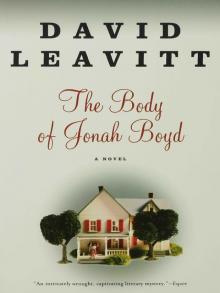 The Body of Jonah Boyd
The Body of Jonah Boyd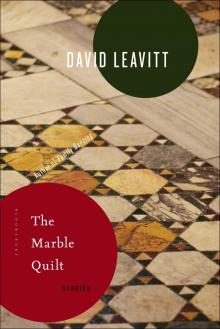 The Marble Quilt
The Marble Quilt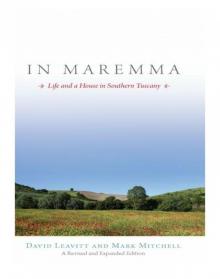 In Maremma
In Maremma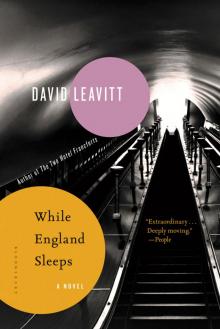 While England Sleeps
While England Sleeps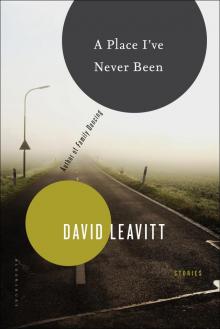 A Place I've Never Been
A Place I've Never Been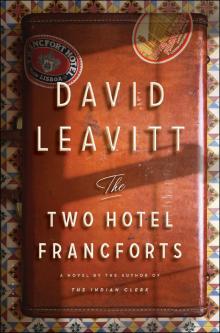 The Two Hotel Francforts
The Two Hotel Francforts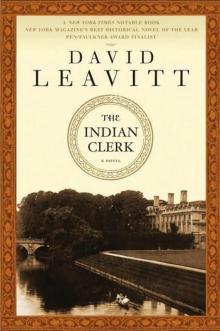 The Indian Clerk
The Indian Clerk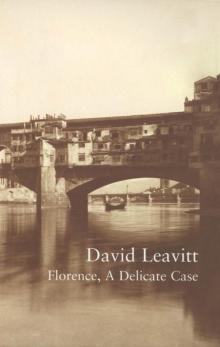 Florence
Florence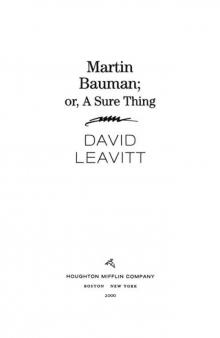 Martin Bauman
Martin Bauman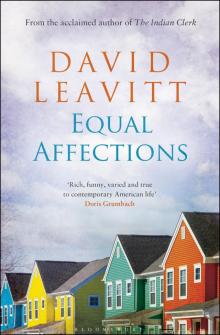 Equal Affections
Equal Affections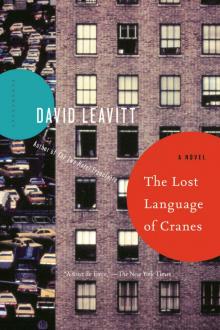 The Lost Language of Cranes
The Lost Language of Cranes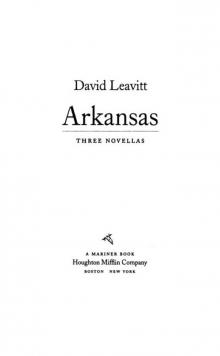 Arkansas
Arkansas